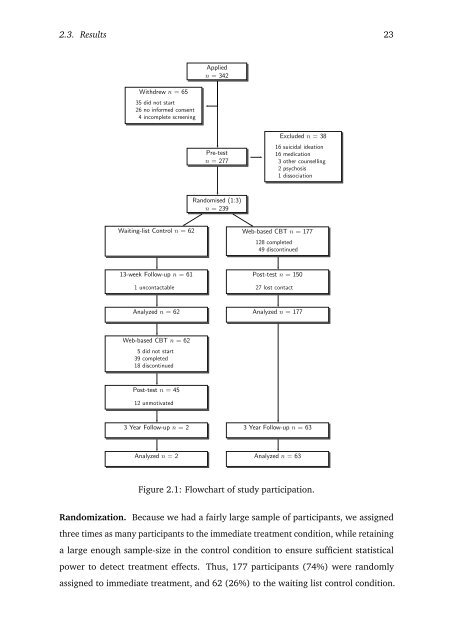- Page 1: The Efficacy andEffectiveness ofOnl
- Page 4 and 5: The studies in this thesis were sup
- Page 6 and 7: Promotiecommissie:Promotores: Prof.
- Page 8 and 9: 6 Online CBT in Routine Clinical Pr
- Page 10 and 11: 2 Chapter 1. General Introductionps
- Page 12 and 13: 4 Chapter 1. General Introductiongr
- Page 14 and 15: 6 Chapter 1. General Introduction1.
- Page 16 and 17: 8 Chapter 1. General Introductiontr
- Page 18 and 19: Ruwaard, J., Lange, A., Bouwman, M.
- Page 20 and 21: 12 Chapter 2. Online CBT of Work-Re
- Page 22 and 23: 14 Chapter 2. Online CBT of Work-Re
- Page 24 and 25: 16 Chapter 2. Online CBT of Work-Re
- Page 26 and 27: 18 Chapter 2. Online CBT of Work-Re
- Page 28 and 29: 20 Chapter 2. Online CBT of Work-Re
- Page 32 and 33: 24 Chapter 2. Online CBT of Work-Re
- Page 34 and 35: 26 Chapter 2. Online CBT of Work-Re
- Page 36 and 37: 28 Chapter 2. Online CBT of Work-Re
- Page 38 and 39: 30 Chapter 2. Online CBT of Work-Re
- Page 40 and 41: 32 Chapter 2. Online CBT of Work-Re
- Page 42 and 43: Ruwaard, J., Schrieken, B., Schrijv
- Page 44 and 45: 36 Chapter 3. Online CBT of Depress
- Page 46 and 47: 38 Chapter 3. Online CBT of Depress
- Page 48 and 49: 40 Chapter 3. Online CBT of Depress
- Page 50 and 51: 42 Chapter 3. Online CBT of Depress
- Page 52 and 53: 44 Chapter 3. Online CBT of Depress
- Page 54 and 55: 46 Chapter 3. Online CBT of Depress
- Page 56 and 57: 48 Chapter 3. Online CBT of Depress
- Page 58 and 59: 50 Chapter 3. Online CBT of Depress
- Page 60 and 61: 52 Chapter 3. Online CBT of Depress
- Page 62 and 63: 54 Chapter 3. Online CBT of Depress
- Page 64 and 65: 56 Chapter 3. Online CBT of Depress
- Page 66 and 67: 58 Chapter 3. Online CBT of Depress
- Page 68 and 69: Ruwaard, J., Broeksteeg, J., Schrie
- Page 70 and 71: 62 Chapter 4. Online CBT of Panic S
- Page 72 and 73: 64 Chapter 4. Online CBT of Panic S
- Page 74 and 75: 66 Chapter 4. Online CBT of Panic S
- Page 76 and 77: 68 Chapter 4. Online CBT of Panic S
- Page 78 and 79: 70 Chapter 4. Online CBT of Panic S
- Page 80 and 81:
72 Chapter 4. Online CBT of Panic S
- Page 82 and 83:
74 Chapter 4. Online CBT of Panic S
- Page 84 and 85:
76 Chapter 4. Online CBT of Panic S
- Page 86 and 87:
78 Chapter 4. Online CBT of Panic S
- Page 88 and 89:
80 Chapter 4. Online CBT of Panic S
- Page 90 and 91:
82 Chapter 4. Online CBT of Panic S
- Page 92 and 93:
Ruwaard, J., Lange, A., Broeksteeg,
- Page 94 and 95:
86 Chapter 5. Online CBT of Bulimic
- Page 96 and 97:
88 Chapter 5. Online CBT of Bulimic
- Page 98 and 99:
90 Chapter 5. Online CBT of Bulimic
- Page 100 and 101:
92 Chapter 5. Online CBT of Bulimic
- Page 102 and 103:
94 Chapter 5. Online CBT of Bulimic
- Page 104 and 105:
96 Chapter 5. Online CBT of Bulimic
- Page 106 and 107:
98 Chapter 5. Online CBT of Bulimic
- Page 108 and 109:
100 Chapter 5. Online CBT of Bulimi
- Page 110 and 111:
102 Chapter 5. Online CBT of Bulimi
- Page 112 and 113:
Ruwaard, J., Lange, A., Schrieken,
- Page 114 and 115:
106 Chapter 6. Online CBT in Routin
- Page 116 and 117:
108 Chapter 6. Online CBT in Routin
- Page 118 and 119:
110 Chapter 6. Online CBT in Routin
- Page 120 and 121:
112 Chapter 6. Online CBT in Routin
- Page 122 and 123:
114 Chapter 6. Online CBT in Routin
- Page 124 and 125:
116 Chapter 6. Online CBT in Routin
- Page 126 and 127:
118 Chapter 6. Online CBT in Routin
- Page 128 and 129:
120 Chapter 6. Online CBT in Routin
- Page 130 and 131:
122 Chapter 6. Online CBT in Routin
- Page 133 and 134:
Chapter 7General DiscussionPrevious
- Page 135 and 136:
7.1. Key Findings 1277.1.2 The effe
- Page 137 and 138:
7.1. Key Findings 129Work−related
- Page 139 and 140:
7.2. Strengths and limitations 1317
- Page 141 and 142:
7.2. Strengths and limitations 133s
- Page 143 and 144:
7.3. Implications for clinical prac
- Page 145 and 146:
7.4. Suggestions for future researc
- Page 147:
7.5. Conclusion 139Post-treatment b
- Page 150 and 151:
142 Summaryof the introduction prov
- Page 152 and 153:
144 Summarythat face-to-face contac
- Page 154 and 155:
146 Summarycomplex, routine practic
- Page 157 and 158:
SamenvattingIn 1997 ontwikkelden on
- Page 159 and 160:
Samenvatting 151startten direct met
- Page 161 and 162:
Samenvatting 153up-metingen suggere
- Page 163 and 164:
Samenvatting 155ongeveer gelijk zou
- Page 165 and 166:
ReferencesAben, I., Verhey, F., Lou
- Page 167 and 168:
References 159Bickel, R. (2007). Mu
- Page 169 and 170:
References 161apy Research, 1(2), 8
- Page 171 and 172:
References 163Hay, P. P., Bacaltchu
- Page 173 and 174:
References 165for bulimia nervosa:
- Page 175 and 176:
References 167Mond, J. M., Hay, P.
- Page 177 and 178:
References 169(2003). The developme
- Page 179 and 180:
References 171of change in psycholo
- Page 181 and 182:
DankwoordAlleen mijn naam staat op
- Page 183:
Dankwoord 175en Janneke Broeksteeg
- Page 186 and 187:
178 Curriculum VitaeLange, A., & Ru


